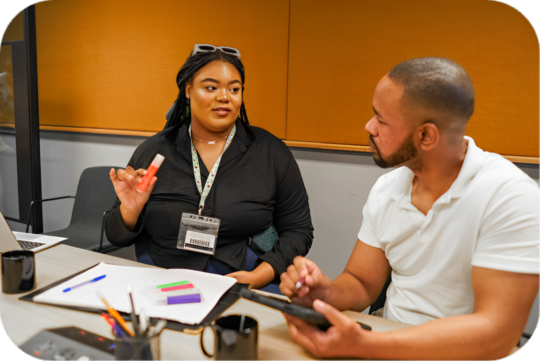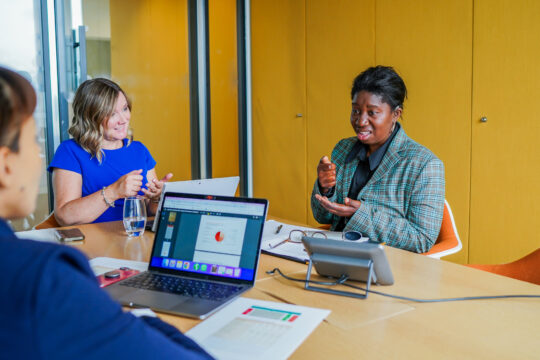The Civil Service recruits using Success Profiles. This means for each role we advertise, we consider what you will need to demonstrate to be successful.
Our Success Profile is made up of five elements:

Watch our overview of the Success Profiles Framework
Behaviours
What are behaviours
Behaviours are the actions and activities that people do which result in effective performance in a job.
The Civil Service has defined a set of behaviours that, when demonstrated, are associated with job success. Civil Service Behaviours are specific to the grade level of the job role.
You won’t be asked to demonstrate all Civil Service behaviours, only those relevant to the role.
Why we assess behaviours
When looking at behaviours, we want to get an understanding of the actions and activities that you have done (or would do) that result in effective performance in a job.
As behaviours can be observed and measured, they can help us to predict what your performance in the role could be.
How we assess behaviours
Behaviours can be assessed in a number of ways and at various stages of the recruitment process, including:
– application forms that ask for written examples
– CV
– Civil Service judgement test
– personality test
– interview
– job related simulations such as:
– presentation
– in-tray exercise
– written analysis/exercise
– role-play
– oral briefing
– assessment centre
Depending on the type of assessment, for example in an application form or at an interview, you may be asked to give examples of when you have demonstrated a particular behaviour. This might be at work or somewhere else such as:
– work experience
– volunteering
– in connection with a hobby
Alternatively, you may be asked how you would behave in a given situation, for example by using Situational Judgement Tests or through situational interview questions. You could also be asked to demonstrate a behaviour in real-time, for example during a structured behavioural assessment.

Strengths

What are strengths?
Strengths are the things that we do regularly, do well and that motivate us.
The Civil Service Strengths Dictionary is a set of defined strengths. They are relevant to the culture and type of work that we do.
Civil Service Strengths are not defined by job grade.
There are three elements which determine whether something is a strength:
– Performance – you can perform an activity/behaviour to a high level of capability
– Engagement – you feel motivated, enthused and empowered when doing the activity.
– Use – you do the activity regularly and as often as possible.
Why we assess strengths
When we look at your strengths, we want to know if you are a good fit with the organisation or job role. We will look at what you enjoy doing and what you do well and often. By making sure that the role is the right fit, you are more likely to enjoy it and perform well.
How we assess strengths
Strengths can be assessed in a number of ways, such as:
– interviews
– recorded video interviews
– bespoke situational strengths test
– simulation assessment
– personality tests
We may ask questions at your interview to help us understand if you have the relevant strengths for the job. It is important to remember that there are no right or wrong answers to these questions.
The job advert will describe the qualities you need for the role.
Do not rehearse your answers – because we are looking for your initial response.
The best way to prepare is to reflect on:
– what you think your personal strengths are
– your preferred ways of working
Your strengths may be assessed alongside other elements of the Success Profile. This helps us to get a more rounded picture of your suitability for the role.
Ability
What is ability?
Ability is the aptitude or potential to perform to the required standard.
The Civil Service has a set of psychometric tests which we use to help predict future performance. These include a verbal reasoning test and a numerical reasoning test.
Why we assess ability
When testing your ability we want to understand your aptitude for a particular type of work.
We assess ability to help predict future performance. This can help recruiting managers to get a real understanding of if you have the skills for the role. It can also help them assess your suitability for the type of work the Civil Service does.
How we assess ability
Ability can be assessed using psychometric tests, often in an online internet-based format.
Ability can be assessed at various stages of the recruitment process. However, it is often done at the beginning.
The most common tests which we use in the Civil Service are:
– Verbal Reasoning Test (VRT) – to assess your verbal capabilities
– Numerical Reasoning Test (NRT) – to assess your numerical capabilities
The tests are scored automatically. You will be told if you have achieved the pass benchmark. These tests will not be the only form of selection. If you pass, you will receive information about the next step in the recruitment process.

Experience

What is experience?
Experience is the knowledge or mastery of an activity or subject gained through involvement in or exposure to it.
In the Civil Service, experience is most often needed for senior roles or roles in the professions.
Why we assess experience
When looking at your experience, we’re looking for examples of things you have previously achieved or your knowledge in a particular field, which are relevant to the job role.
We’re not looking at how much time you spent in a particular field, but rather how you performed.
Sometimes experience can be transferable from a non-work context. Skills gained through voluntary work or a hobby, such as teamwork or communication, can demonstrate the experience required for the role.
How we assess experience
We’ll be looking at your career history and any achievements that are relevant to the role.
Some of the assessment methods we use to understand your experience are:
– application forms
– CVs
– interviews
We may ask you to provide your CV or personal statement in an anonymised format. This will remove information that could identify you, such as your name, age or gender.
You may also be asked to only include educational qualifications which are relevant to the role you are applying. For example, professional qualifications. This is to make sure that:
– the process is fair
– irrelevant information is not taken into account during the selection process
Technical
What is technical?
The Technical element is the demonstration of specific professional skills, knowledge or qualifications.
Why we assess technical
There are more than 20 professions in the Civil Service. The professions offer a wide range of roles, including some specialised ones.
The head of each Profession defines the specific skills, knowledge and qualifications we may ask you to demonstrate to be successful in these roles. For example, a specialised role in Government Finance may need candidates to have:
– accountancy qualifications
– knowledge of the way we manage finance within government
How we assess technical
If the role you are applying for is within a profession, additional information about the technical requirements for that role will be included within the job description.
Some of the assessment methods we use to assess your technical skills are:
– application form
– CV
– interviews
– technical presentations and exercises
– technical tests
– presentation
– work samples
– job-related simulation
– oral briefing exercise
– written analysis/exercise
– assessment centre
If there is a need for a particular qualification or membership of a professional body, you may be asked to provide evidence that you hold this.

Reasonable adjustments
The Civil Service is a diverse and inclusive workplace. We want to help you show your full potential whatever type of assessment we use. If you need any reasonable adjustments let your recruiting manager know. Examples of adjustments can include:
- providing documents in large print or braille
- allowing more time for a test or interview or
- providing assistance at an assessment centre

How to write your personal statement
For some jobs you’ll be asked to provide a personal statement or statement of suitability. Find out how to stand out.

Demonstrating behaviours
Behaviours are the things that people do that result in effective performance. Read more about the behaviours we use to assess you.

Assessments and interviews
Read about the different kinds of assessments you might be asked to do, after you’ve submitted an application form.

About the application
process
Read about the stages of the recruitment process, from finding a job to learning if you’ve been successful.
